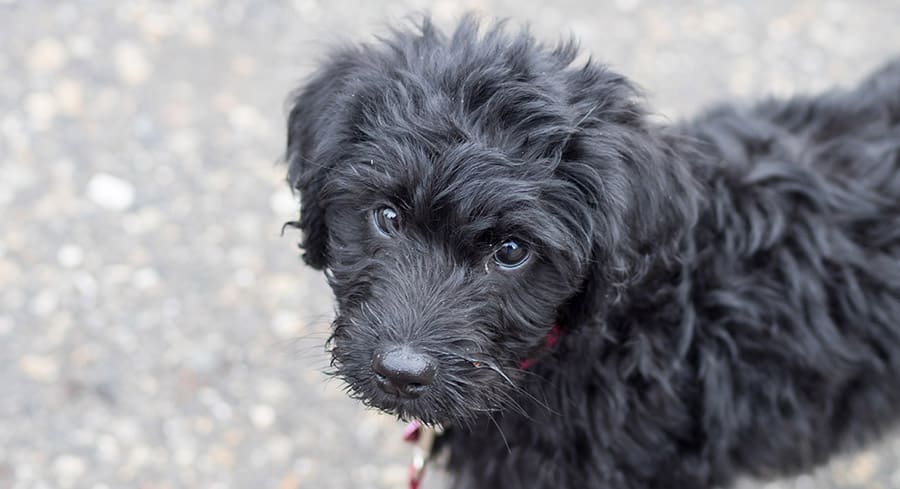A lot of work goes into bringing a new dog into your home. It’s a significant time and money investment and shouldn’t be rushed.
When we were researching our Labradoodle, Oliver, cost was a big factor (shh, don’t tell him). And if you’re like most people, you’ll have the same question.
So, how much does a Labradoodle cost? On average, a Labradoodle costs somewhere between $1,200 and $3,000. The two main factors that impact the price range are the overall quality of the breeder and the quality of the breeding stock (parents of the puppies) the puppies come from.
In your search, you might find ‘Labradoodles for Sale’ postings in online classifieds or on Facebook marketplaces offering puppies for $300-500.
And while these low-cost Labradoodles are tempting, you really need to understand where they’re coming from.
Because of this breed’s spike in popularity within the past 10 years, tons of low-quality “puppy mill” breeders have sprung up.
Starting your Labradoodle adventure is certainly exciting, but you should be well-armed with knowledge before you actually contact a breeder.
We answer tons of common questions in our other Labradoodle articles, but I can’t recommend picking up a copy of our Labradoodle guidebook enough.
You’ll find a treasure trove of information on issues such as:
- Selecting the perfect puppy.
- Working with a breeder.
- Critical home preparations.
- Recommended toys, tools, and supplies.
- Grooming – both professional and DIY.
- Exercising their bodies and minds.
- Socialization.
- Training – reward-based, housebreaking, crate training, and obedience.
- And much more.
Even if you’re still in the decision phase, get this book so you’ll know exactly what to expect with this wonderful breed.
Actual Labradoodle Costs
We’ve put together some real costs of Labradoodles from quality breeders across the US.
| Breeder Name | State | Cost |
| Texas Labradoodles | Texas | $3,000 |
| Crockett Doodles | California, Michigan, Pennsylvania, South Carolina | $1,200 |
| New Life Kennels | Illinois | $1,500 |
| Arch View Labradoodles | Missouri | $2,750 |
| South Florida Australian Labradoodles | Florida | $3,000 |
Keep in mind that the price of the puppy is only part of the initial cost of dog ownership.
Our New Puppy Checklist gives you an easy way to keep track of items you already have and ones you still need to pick up.
As an owner of 2 Labradoodles myself, I know how tough it can be to find good information. In the 60+ pages of this book, I share the information, resources, and breed-specific tips I wish I’d had from the start. You will save you time, money, and loads of frustration…take my word for it!
Breeder Quality
The breeder plays a big part in the quality of the puppy you’ll get. Just think, they’re your puppy’s primary caregiver for the first 8-10 weeks of their life.
Everything that goes into making a good breeder adds value and factors into the price you pay.
We recommend working with a quality breeder when getting a Labradoodle. We explain ways to identify reputable breeders and questions to ask in this article.
Caring for the Puppies
This goes beyond simply making sure the puppy has food and water.
- What kind of food are the puppies being fed? Their nutrition is really important throughout their lives, but even more so when they’re just pups. A good breeder will be able and willing to tell you this (it also helps you prepare for bringing your puppy home).
- What’s the condition of the space the puppies are being kept in? Puppies are like human babies — they are prone to getting sick early on. So you’ll want to make sure the puppies have a clean and healthy living environment.
- Smell the puppies! That’s one of the first things I notice when we visited our breeder. The puppies smelled clean and freshly bathed. That’s a great sign.
- Are the puppies receiving the proper vaccinations when they should be? Puppies have a schedule of preventive vaccination and immunizations they should be getting in the first year of their life.
- What about once you take the puppy home? You should be taking a ‘care guide’ home with you from the breeder and they should be available to answer any/all questions you might have once you’re home. (I STILL message our breeder, Breann, with questions or ask her for recommendations…and to send her pictures of Ollie of course.)
Socialization and Stimulation
Dr. Becker makes a great comment, saying that “Good puppies aren’t born, they’re made” (source). This is so true! And it starts early on.
While you can’t expect the breeder to do all the work for you, they should definitely be getting the process of socializing and desensitizing your puppy started.
- From birth, the puppy should handled and all of their body parts touched (paws, mouth, tail, stomach, ears, arms, and legs). This includes laying them on their back. All of this helps get them used to things they’ll experience later in life…like vet visits or trips to the groomer.
- Once a few weeks old, they should be getting exposed to people in a controlled environment (our breeder has three kids, which are great puppy socializers).
- They should be exposed to different surfaces, noises, and encouraged to explore their surroundings, while not startling them too much or endangering them.
Giving them this foundation makes training your puppy easier down the road and also makes them a much more adaptable pup.
Low-quality and inexperienced breeders don’t know or care to go to these lengths.
Be sure to head over to this article for valuable tips on continuing socialization after you bring your puppy home.
Responsible Breeding Practices
A quality breeder puts the overall well-being of their puppies far beyond the money they make from breeding.
- Get ready to fill out some paperwork! You’ll likely have to go through an application process in order to get a puppy from a good breeder. They’ll probably have you sign a contract, too. They know how important it is to make sure the puppies they send home are going to a home where they’ll be cared for.
- They should also not overbreed their dogs and should have limitations on the time between each girl’s litters and the number of litters each can have in their lifetime.
- If something happens down the road and you’re unable to care for your Labradoodle, a good breeder will reserve first rights to getting that dog back. This goes back to their commitment to the overall well-being of the dogs they home.
Visit this page to find a Labradoodle breeder near you.
Quality Of The Breeding Stock
Determining the quality of the breeder is pretty easy, while understanding the quality and genetics of the breeding stock takes a bit more research.
Breeding Stock Genetics
This part is expensive but is critical to the breeding process for Labradoodles, because certain health conditions often appear within the breed.
If a breeder starts with a sire (father) and dam (mother) with poor genetics or disease and health problems, what effect will this have on their litter? Beware!
This part is usually overlooked or neglected by non-reputable breeders because it involves costly genetic testing and screening done by organizations like the Orthopedic Foundation for Animals (source).
Breeders will usually include this information on their website, but you’ll want to be sure to ask.
Health Guarantees
It’s a good sign if the breeder offers a health guarantee on their pups against genetic disease.
Our breeder offered an 18-month replacement guarantee, which was really great (see below). From what I’ve seen, reputable breeders usually offer 12-24 months of guarantee.
“If in 18 months the puppy should develop a life threatening, hereditary disorder, we will replace the puppy with another puppy of equal value and sex at the soonest availability.”
Our Recommendations To You
- Do your research on the breeder and the breeding stock they use to produce puppies. We checked the social media accounts of different breeders we were considering to see what others were saying.
- Talk to the breeder in advance. See how knowledgeable they are about the breed. Come with some good questions that you know the answers to, and compare their responses.
- Ask the breeder what all goes into the cost of their Labradoodles.
- Ask them what they do with the puppies regarding socialization.
- Ask what vaccinations and immunizations they’ll have when they go home AND if they provide a health guarantee for their pups.
Related Questions:
Should I visit breeders before making my decision to purchase a Labradoodle?
Yes. We highly recommend that you schedule a visit to see any and all breeders you are considering getting a Labradoodle from.
The Humane Society states “Never buy a puppy without seeing the place where he or she was born and raised” (source).
Will the breeder require a deposit for the puppy?
Yes. Most breeders will require that you give them a deposit (typically $250-500) to secure your puppy in the litter of your choice.
They may also ask you to pay another portion of the total cost once the puppy is born, to help with costs of caring for them.
Why are Labradoodles such a popular breed?
Labradoodles are popular and highly regarded for many reasons, including their great personalities, family and allergy-friendly nature, and their low-to-no shed coats.
They’re a hearty and active breed that loves being out-and-about but will need owners that live the same kind of life.
That’s A Wrap
We had no clue so much goes into giving a Labradoodle puppy life. But when you take a step back and consider all the time, care, and resources breeders invest, it’s totally worth the cost.
Don’t you agree? After all, they do become part of the family, right?
The Owner’s Guide To The Perfect Labradoodle will tell you everything you need to know about selecting a pup, working with breeder, preparing your home, and, of course, how to successfully raise a perfect, loving dog. Grab your copy today!






